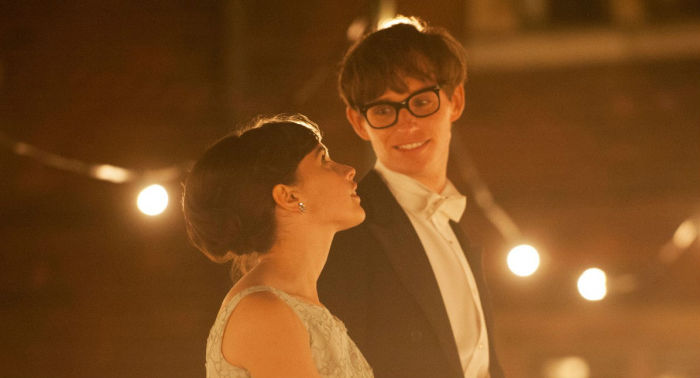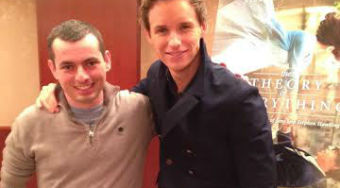Interviews
Eddie Redmayne

The Theory of Everything stars Eddie Redmayne as the brilliant physicist, buy Stephen Hawking. JohnHanlonReviews.com recently sat down at a roundtable interview with Redmayne alongside out colleagues Lauren Veneziani and Lauren Bradshaw. [WARNING: SPOILERS AHEAD]
Check out the slightly edited transcript of our conversation below.
Lauren V.: You’ve played characters based off of fictional elements [before] and obviously here your character is a real-life person who is still alive. Is there more pressure when it’s a real-life person or do you take on every role the same way?
Eddie: Well, the real answer is there is more pressure. I try to be as true when I’m playing anyone. If I’m Colin Clark in My Week With Marilyn or Tony Baekeland in Savage Grace, who are no longer alive, you do the research, but if they are not that famous you have more of a freedom [to] slightly embellish or change the story. But here, when you know that the person you are playing is actually going to watch the movie and review the film, you feel like you better stick with it. Especially since the public has a specific knowledge of him, that raises the stakes.
But equally in that, Felicity [Jones] was amazing and could have done that because in some ways, Jane is less known. She could have done what I have done on other films, but when she met Jane, there is a unique quality of her voice, the way she moves and Felicity was so rigorous in her authenticity. But we knew the whole family and the kids would see the film. I try to be as meticulous with any part I am playing, but here the stakes felt higher and force you to work a bit harder.
Lauren B.: Speaking of Felicity, you two had such amazing chemistry in the movie, I was wondering how long you have known each other and how you met?
Eddie: We met… We’ve known each other for about ten years. I think we first met in a screen test for a film she was attached to that actually never ended up happening. So, we had a screen test there and then there was a period about 6-7 years ago when a director called Michael Grandage, an amazing theater director who directed Red, actually… he ran a theater in London called the Domnar Warehouse, which was an amazing little theater. He was hugely supportive of both Felicity and I and our early career. [Felicity and I] both did plays in the same season there, but we weren’t in the same play. So, we were pals and I admired her work hugely from a distance, so when she got cast it in this, it was one of those great things where she is a friend and so you already have a certain trust and that friendship, which is so important because it was a pretty rigorous shoot. Also, we were both fiercely protective of our characters and it was quite difficult at times, and complicated, but our friendship was the thing that pummeled it through.
John: In a lot of other movies like My Week with Marilyn or Les Mis, you’re on the outside looking in and sometimes a bit naive. Here you’re the smartest guy whatever room you walk into so what’s the difference for you as an actor?
Eddie: Well, I definitely had sleepless nights about playing a genius basically. How do you play someone [like that]? I’ve been to Cambridge. When I was there, really bright people– like uber- bright people– that I met. What was so extraordinary about them was they had such confidence. Their confidence and their intellect meant that they didn’t feel the need to demonstrate it. That make sense? They don’t condescend. They don’t talk down to you. It’s only people who are slightly more intellectually insecure who feel the need to show– to be ostentatious– so I basically used that as my get out of jail free card. If I can pretend to really know what I’m talking about, maybe it will look like that. It was interesting cause I look at the challenges. I actually found my Week with Marilyn quite a tough gig even though on paper it was like “I went to the same school…. Some people say ‘you just play yourself but I find that pretty hard to do.’ Quite a lot of people say that actor only plays himself… If I play myself, maybe it’s a really complicated thing to do because in that film– in My Week with Marilyn, it was about not getting in the way of the audience. The audience was seeing the experience almost through my eyes so it was that thing of trying not to get in the wat but also not necessarily that could be irritating as well if someone was being sort of gentle and nice. It’s a weird balance but definitely in this, what I loved was his strength of character. It was lovely to be able to play someone who has this fantastic confidence in his own.
Lauren V.: Clearly, this role is a very transformative one for you, so can you talk about the movements and voice training you had to do? I’m sure when you are filming out of order, there are some days where you are walking and in a wheelchair at the same time.
Eddie: I basically just submersed myself in it. When you are playing someone who has a disease and there are many people who are suffering from the reality of that, you have no choice but to educate yourself. They day after I got cast, I went to a neurology clinic in London and was educated by the specialists there and they introduced me to people suffering from ALS and their families [and I saw] the physical and emotional ramifications. Stephen’s specific timeline was complicated because there isn’t any documentary footage that I could find before the 1980s. And in the ‘80s, he’s in a wheelchair already and what steps there was before the wheelchair were intriguing because I based it off of photographs and working with a specialist on working on what the decline was. Then I had to find that in my body. I’d work every few days over those four months with a dancer [named] Alexandra Reynolds. She worked on World War Z [on] how the zombies moved. She’s a dancer and artist and was very helpful and had been through all of the minutia of that experience with me. Also, when you are doing something, you can feel that its right, but unless someone can see it from the outside, its good to have another set of eyes.
Lauren B.: Obviously Stephen is a nerd about space, so I was wondering what you’re a nerd about in your everyday life?
Eddie: What am I a nerd about? Oh my God! That’s a really good question. I feel like I should have a much better answer for this. Well, I play the piano. I don’t know if it’s a nerd, but I’m still that kid that goes and does piano practice when I’m home. I find it takes me out of my head and it’s like you’re purely focused. As a kid, I hated practicing and you just want to play stuff you knew. Whereas now, I find it quite good because you can only focus on the task at hand because I’m not very good. It’s quite therapeutic in some ways. It takes you out of your own head.
Lauren B.:Are you a big movie fan? I know some actors don’t go to movies.
Eddie: Yeah! I love going and seeing really good films. When I was younger, though, I got into acting to do theater and I thought the idea of sitting home and watching a load of DVDs… my family work in business… so the idea of when I was starting… being like, “What did you do today?” “I watched three DVDs,” was not cool! It came to a point when I was working with Scarlett Johansson and she said to me… we were having some chat where she was talking about The Big Lebowski and I said I hadn’t seen it. She did this whole thing like, “WHAT?!” Then she was like, “Well, you know in The Godfather…” I was like, “Haven’t seen it,” and she said “WHAT?!” So she basically went around the crew of this film and they wrote a list, so I started watching. I said to her, “I feel like I can’t watch DVDs.” She said, “It’s your JOB,” and it’s true! I love going to the cinema. I don’t know if you guys have seen Two Days One Night with Marion Cotillard? It’s an amazing movie and Birdman is so beautiful!
Lauren B.: We just saw Interstellar and I was like, “I wish I had Stephen Hawking here to help me figure out some parts of the movie.” [everyone laughs] It’s a great movie, though they definitely don’t try to dumb it down for the audience!
Eddie: Yeah, I’ve heard it’s a great movie. I’ll be calling Stephen Hawking. [laughs] I heard Kip Thorne [was a consultant on Interstellar]. He and Stephen have done a lot of work together. I love the idea of the two films being complementary pieces!
John: I read some interviews where [you said] you were nervous about this becoming a caricature. How do you get over that fear and do you ever get over that fear?
Eddie: Every day and James, the director, wrote an interesting e-mail recently where he was talking about how when we were shooting, it felt like you were on this tightrope of being that close to failure. And failure meaning overexaggerating– being inauthentic… So the way you get over that fear is to educate yourself. It’s just to keep doing the work. You’ve got to be so confident in your knowledge in what the reality of the disease is and the work that you’ve done but you never get over that [fear]. You never really do and I watch the film now and I still see the bits where I– I see the days where and it’s always a random scene when I was in a physicality for the first time in the film even though I prepped beforehand, I’d been doing a few weeks of not having done that physicality and then suddenly I can see that I’m not entirely inhabiting it…
John: Did you get to shoot a lot of scenes over and over again just to make sure?
Eddie: Felicity and I both wanted [to] because we love…People talk about how David Fincher makes his movies. That’s our dream. You never get it right. The weird thing is what people say about theater. How can you do a play months on end and the answer’s cause you never get a line right, let alone a whole sort of scene or play right. The wonderful thing in theater is that you can come back the next night and try to sort it out and you never get there. You never reach it. The thing about film is you have that– I remember one particular [scene] in Les Miserables– the big song that my character has. You really only have like four hours and you’ve done months and months and months of work and you know that once you leave after that four hours, there’s nothing you can do to sort it. You just have to wait nine months and then see the things– the mistakes that you made so you want to just do it again and again and again even if that’s just so you know that by the end it hurt, so that when you then see the film and you’re not happy with it, you know you gave it everything because you’re never gonna be content with it.
Lauren B.: And your voice must have been going out during all of the takes of Les Miserables. Was that an issue?
Eddie: It was an issue, but similarly in the way we trained here physically, we had trained vocally for months. But, as your voice was going out, what was interesting was we could use that in emotional scenes. You could play with the brittleness of the voice and the fragility.
Lauren V.: I particularly loved the scene in [this] movie where you and Felicity were spinning and I know you said you shot that on the first day. When you were reading the screenplay, was there a particular scene that you were excited about seeing transition to film?
Eddie: You know what’s odd is that it is a scene that didn’t make it into the film. Randomly, it makes it into a bit of the trailer, but it is a scene in which Stephen comes out of the hospital and he’s by himself and he is standing there on this path and he tries to run. He basically goes from a walk into a run and his body has shifted and changed and he ends up collapsing on a tree. Often when you are making a film, you’re playing the character, but you don’t see it how the director or cinematographer see it. In the end, it wasn’t put in the film because it was this raw and absolute anger and that moment needed to be sustained to the croquet match [between Stephen and Jane].
Lauren B.: I really liked in the film that they didn’t make Stephen this saint, he did have his flaws. Jane dedicated her life to him, well I hate to say dedicated her life, but she kind of did, and then he left her for the nurse. Can you talk about that?
Eddie: What was so important to us, to all of us… Charlie Cox, Felicity, Maxine Peake, and I was who are we to judge these people? What I hope an audience leaves thinking is what would you do? So many obstacles were put in front of these two people’s way and how they chose to overcome them was particularly extraordinary and unique to them. There are various sides to it and Anthony described it last night as being layered. For me, there is… if you are unable to move and from the age of 23 or 24, you’re entirely physically dependent on someone else, think of what the guilt must be. And the idea of how often do you say thank you? Do you say thank you every time something is done for you? How do you retain your sense of self and pride when you’re entirely reliant on someone. I feel like Stephen chose to go, “I’m going to close myself off. I’m not going to feel that.” I don’t want to speak for him. That’s very important because I don’t know. Jane and Stephen became perfectly symbiotically linked. As you said, she gave up everything for him…and he became completely reliant on her. I don’t think either of them could see a way out. But, then there was also the moment where Jonathan Birch literally came to live with them and you are seeing a fully-functional physical alpha male around your wife and you’re constantly reminded of the things you cannot do. I think that when Stephen met and saw the spark between Jonathan and Jane, and when he met Elaine, who fell for who he was then and there, he realized there was a way out for both of them, I think. Whilst it was brutally hard for Jane, and I think probably not even for Stephen as well… it’s so complicated because I don’t want to speak for them… but I feel it was a letting go.












